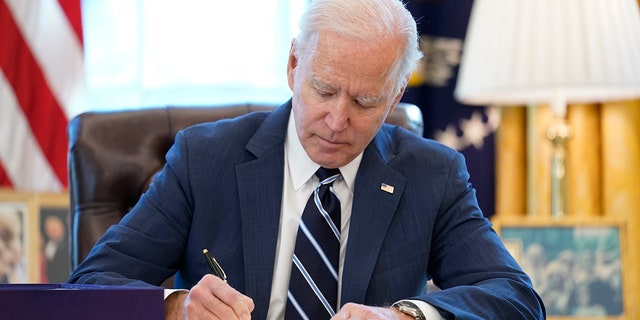
NEWYou can now listen to Fox News articles!
FIRST ON FOX: A federal government agency dedicated to supporting libraries and museums across the country spent $15 million in funds from President Joe Biden’s $1.9 trillion COVID-19 relief package on programs pushing “anti-racist” education and “social activism” for children.
In October, the Institute of Museum and Library Services (IMLS), announced $15,255,733 in American Rescue Plan (ARP) Act project grants “to institutions across 49 states, the District of Columbia, and Puerto Rico to support the role of museums and libraries in recovering from the coronavirus pandemic.”
A review of the grant recipients shows that many projects that received funding from the relief package included “anti-racist” education and “social activism” for school-aged children, and many others which had virtually little to do with recovery efforts.
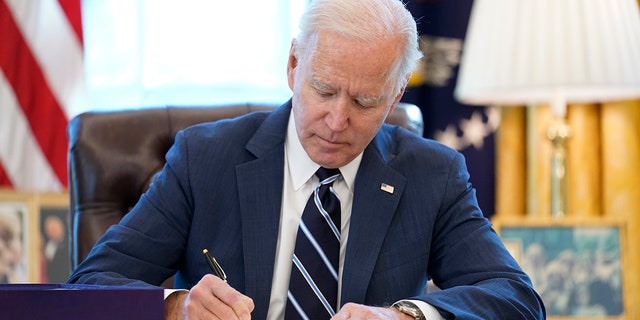
President Joe Biden signs the American Rescue Plan, a coronavirus relief package, in the Oval Office of the White House, Thursday, March 11, 2021, in Washington. (AP Photo/Andrew Harnik)
For instance, the IMLS awarded $49,632 to the Rochester Museum and Science Center in New York for a field trip for third-grade students that will “utilize the ‘Take It Down’ exhibit, which tells the story of a community led effort to remove racist artwork from a historic carousel, as a tool for anti-racism education.”
The IMLS also awarded $43,400 to the Minneapolis Institute of Arts to train guides to “incorporate greater cultural fluency and responsiveness into their tours using an anti-racist lens,” and to “introduce new tour topics for school audiences” regarding “social-emotional learning, identity, empathy, and social activism,” according to the IMLS website.
The IMLS awarded a $50,000 grant to the Whitaker Center for Science and the Arts in Harrisburg, Pennsylvania, to expand its capacity to offer “equity, diversity, and inclusion-focused STEM (science, technology, engineering, and math) programs for pre-K through 12th-grade students in the greater Harrisburg area,” the IMLS website states.
The Brooklyn Museum received $50,000 to create an “intensive arts education curricula” for underserved schools and to produce “content that addresses history and art through an anti-racist lens.”
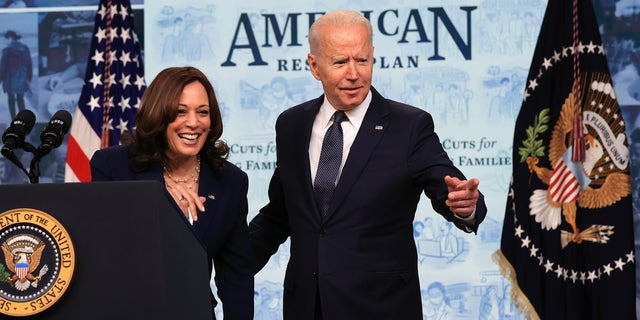
U.S. President Joe Biden and Vice President Kamala Harris deliver remarks on the American Rescue Plan in the South Court Auditorium in the Eisenhower Executive Office Building on July 15, 2021 in Washington, DC. (Photo by Chip Somodevilla/Getty Images)
Some of the projects that received ARP funded grants from the IMLS were less geared toward children but still included activities that appeared to have little to do with helping museums and libraries recover economically from the pandemic.
The Studio Museum in Harlem, New York, for instance, received $50,000 to build a 9-foot bronze statue in Marcus Garvey Park that “addresses Black masculinity, stereotypes and shared diasporic experiences.”
Historic New England in Boston received $49,750 to hire a curatorial fellow to help “amplify marginalized voices and represent a complete history of the region,” as well as to catalog and digitize “A Time to Remember,” the nonprofit’s collecting initiative documenting the impacts of the Black Lives Matter movement and the COVID-19 pandemic.
Northwest Mississippi Community College received $33,000 in ARP funds to create campus “safe spaces” where students can engage on topics dealing with “post-pandemic stress, racial injustice, diversity/inclusion, and resilience.”
The Anchorage Museum in Alaska received $50,000 to hire a “programmatic staff member to collaborate with and support communities of color and LGBTQ communities, as well as a curator to work with communities on climate change and climate justice.”
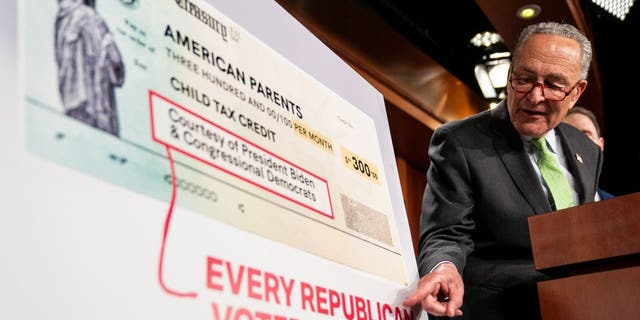
Senate Majority Leader Chuck Schumer (D-NY), flanked by Senate Democrats, Sen. Debbie Stabenow (D-MI), Sen. Cory Booker (D-NJ), Sen. Michael Bennet (D-CO), Sen. Ron Wyden (D-OR), and Sen. Sherrod Brown (D-OH), speaks during a press conference on the Child Tax Credit in the Senate Studio on Capitol Hill on Thursday, July 15, 2021. (Kent Nishimura / Los Angeles Times via Getty Images)
When Democrats passed the ARP in March 2021 without any Republican support, it was billed as an economic necessity for getting the country through the COVID-19 pandemic, and Biden described every allocation of funds in the legislation as essential.
“We need Congress to pass my American Rescue Plan that deals with the immediate crisis — the urgency,” the president said at the time. “Now, critics say my plan is too big, that it costs $1.9 trillion. So that’s too much. Well, let me ask them: What would they have me cut? What would they have me leave out?”
Now, the ARP is facing intensifying scrutiny for its effect on the U.S. economy. Inflation hit 8.6% in May, and some economists, including former Obama administration economic advisers, have blamed the legislation for overheating the economy.
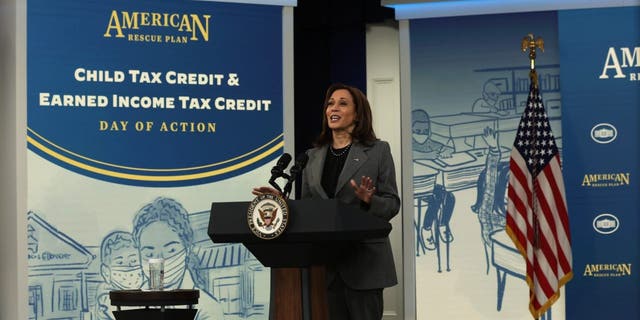
U.S. Vice President Kamala Harris speaks during a Child Tax Credit/Earned Income Tax Credit Day of Action event at the South Court Auditorium at Eisenhower Executive Office Building on February 8, 2022 in Washington, DC. (Photo by Alex Wong/Getty Images)
The IMLS said in a statement to Fox News Digital that it awarded the ARP-funded grants “to support the vital programs and services libraries, museums, federally recognized tribes, and nonprofit organizations serving Native Hawaiians provide to their communities.”
“IMLS helps museums and libraries to connect, and sustain meaningful relationships, with their communities,” the statement continued. “Museums and libraries provide communities with essential services and access to all kinds of health, job, government, educational, social, and cultural resources. These awards enabled museums and libraries to remain strong and relevant community institutions by responding to the challenging issues facing their communities resulting from the pandemic.”
“These major institutions maintain the highest professional standards and have long traditions of engaging with their communities,” the statement concluded. “They are respected for the work they do in, and for, the community including presenting topics that are not only important, but sometimes difficult.”
CLICK HERE TO GET THE FOX NEWS APP
Rep. Ralph Norman, R-S.C., who sits on the House Committee on Oversight and Reform and the House Financial Services Committee, called for an audit of the ARP in a statement to Fox News Digital.
“Like an out-of-control firehose, the federal government has been spewing trillions of dollars under the guise of Covid relief, without any real guardrails or oversight,” he said. “I don’t care how long it takes – we need a top-down audit on how every dollar of the American Rescue Plan has been spent. Any individual or organization who utilized these funds ought to be able to provide a thorough defense of their decisions. And anyone who spent ARP dollars outside the letter or spirit of that law must be held to account.”








